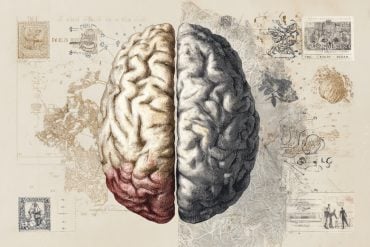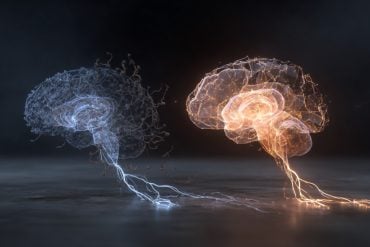Summary: New hypothesis proposes a variation in brain energy expenditure during childhood may be linked to increased obesity risk.
Source: Northwestern University
Weight gain occurs when an individual’s energy intake exceeds their energy expenditure — in other words, when calories in exceed calories out. What is less well understood is the fact that, on average, nearly half of the body’s energy is used by the brain during early childhood.
In a new paper published in the journal Proceedings of the National Academy of Sciences (PNAS), “A hypothesis linking the energy demand of the brain to obesity risk,” co-authors Christopher Kuzawa of Northwestern University and Clancy Blair of New York University School of Medicine, propose that variation in the energy needs of brain development across kids — in terms of the timing, intensity and duration of energy use — could influence patterns of energy expenditure and weight gain.
“We all know that how much energy our bodies burn is an important influence on weight gain,” said Kuzawa, professor of anthropology in the Weinberg College of Arts and Sciences and a faculty fellow with the Institute for Policy Research at Northwestern. “When kids are 5, their brains use almost half of their bodies’ energy. And yet, we have no idea how much the brain’s energy expenditure varies between kids. This is a huge hole in our understanding of energy expenditure.”
“A major aim of our paper is to bring attention to this gap in understanding and to encourage researchers to measure the brain’s energy use in future studies of child development, especially those focused on understanding weight gain and obesity risk.”
According to the authors, another important unknown is whether programs designed to stimulate brain development through enrichment, such as preschool programs like Head Start, might influence the brain’s pattern of energy use.

“We believe it plausible that increased energy expenditure by the brain could be an unanticipated benefit to early child development programs, which, of course, have many other demonstrated benefits,” Kuzawa said. “That would be a great win-win.”
This new hypothesis was inspired by Kuzawa and his colleagues’ 2014 study showing that the brain consumes a lifetime peak of two-thirds of the body’s resting energy expenditure, and almost half of total expenditure, when kids are five years old. This study also showed that ages, when the brain’s energy needs increase during early childhood, are also ages of declining weight gain. As the energy needed for brain development declines in older children and adolescents, the rate of weight gain increases in parallel.
“This finding helped confirm a long-standing hypothesis in anthropology that human children evolved a much slower rate of childhood growth compared to other mammals and primates in part because their brains required more energy to develop,” Kuzawa said.
Source:
Northwestern University
Media Contacts:
Hilary Hurd Anyaso – Northwestern University
Image Source:
The image is in the public domain.
Original Research: Closed access
“A hypothesis linking the energy demand of the brain to obesity risk”. Christopher W. Kuzawa and Clancy Blairl.
PNAS. doi:10.1073/pnas.1816908116
Abstract
A hypothesis linking the energy demand of the brain to obesity risk
The causes of obesity are complex and multifactorial. We propose that one unconsidered but likely important factor is the energetic demand of brain development, which could constrain energy available for body growth and other functions, including fat deposition. Humans are leanest during early childhood and regain body fat in later childhood. Children reaching this adiposity rebound (AR) early are at risk for adult obesity. In aggregate data, the developing brain consumes a lifetime peak of 66% of resting energy expenditure in the years preceding the AR, and brain energy use is inversely related to body weight gain from infancy until puberty. Building on this finding, we hypothesize that individual variation in childhood brain energy expenditure will help explain variation in the timing of the AR and subsequent obesity risk. The idea that brain energetics constrain fat deposition is consistent with evidence that genes that elevate BMI are expressed in the brain and mediate a trade-off between the size of brain structures and BMI. Variability in energy expended on brain development and function could also help explain widely documented inverse relationships between the BMI and cognitive abilities. We estimate that variability in brain energetics could explain the weight differential separating children at the 50th and 70th BMI-for-age centiles immediately before the AR. Our model proposes a role for brain energetics as a driver of variation within a population’s BMI distribution and suggests that educational interventions that boost global brain energy use during childhood could help reduce the burden of obesity.






